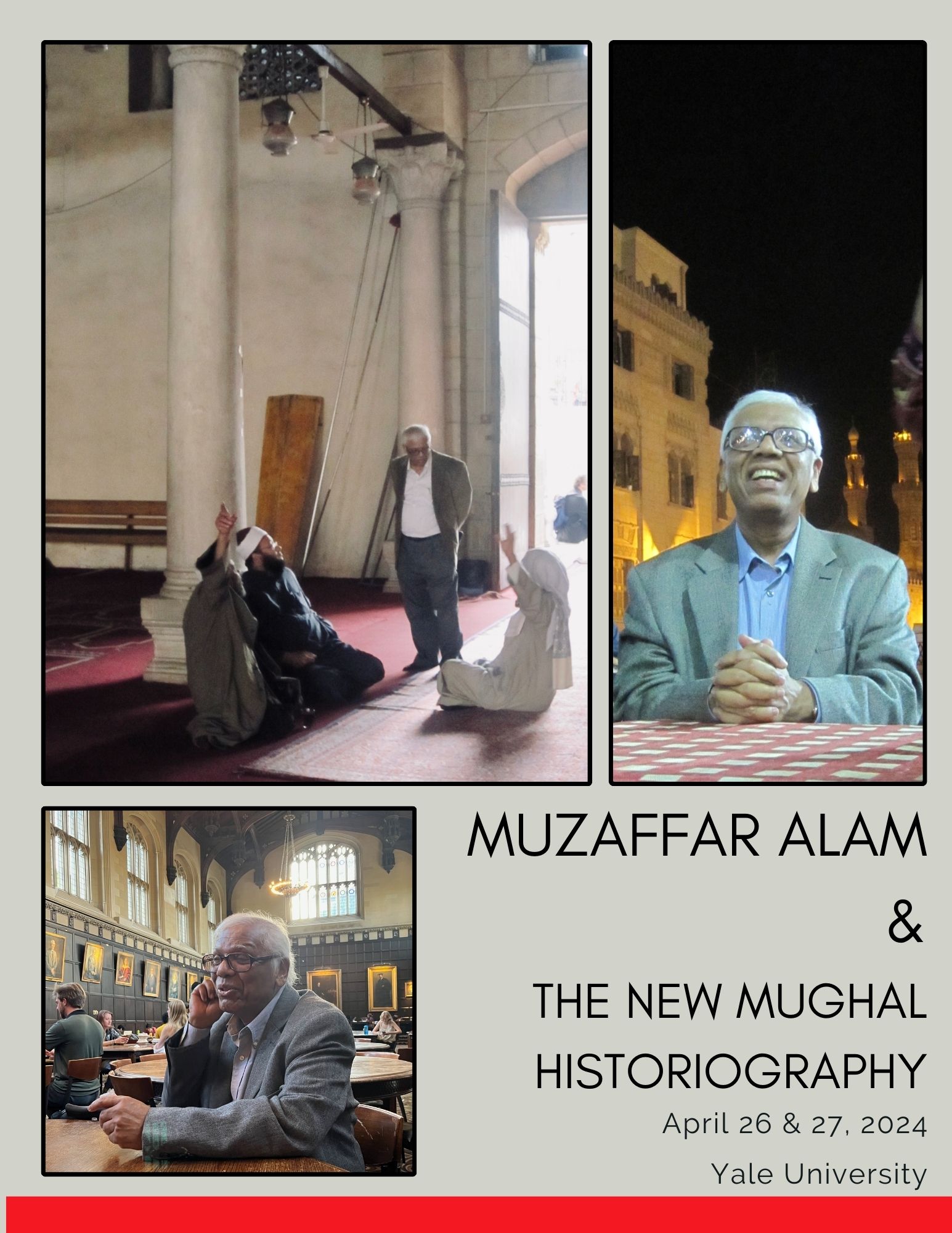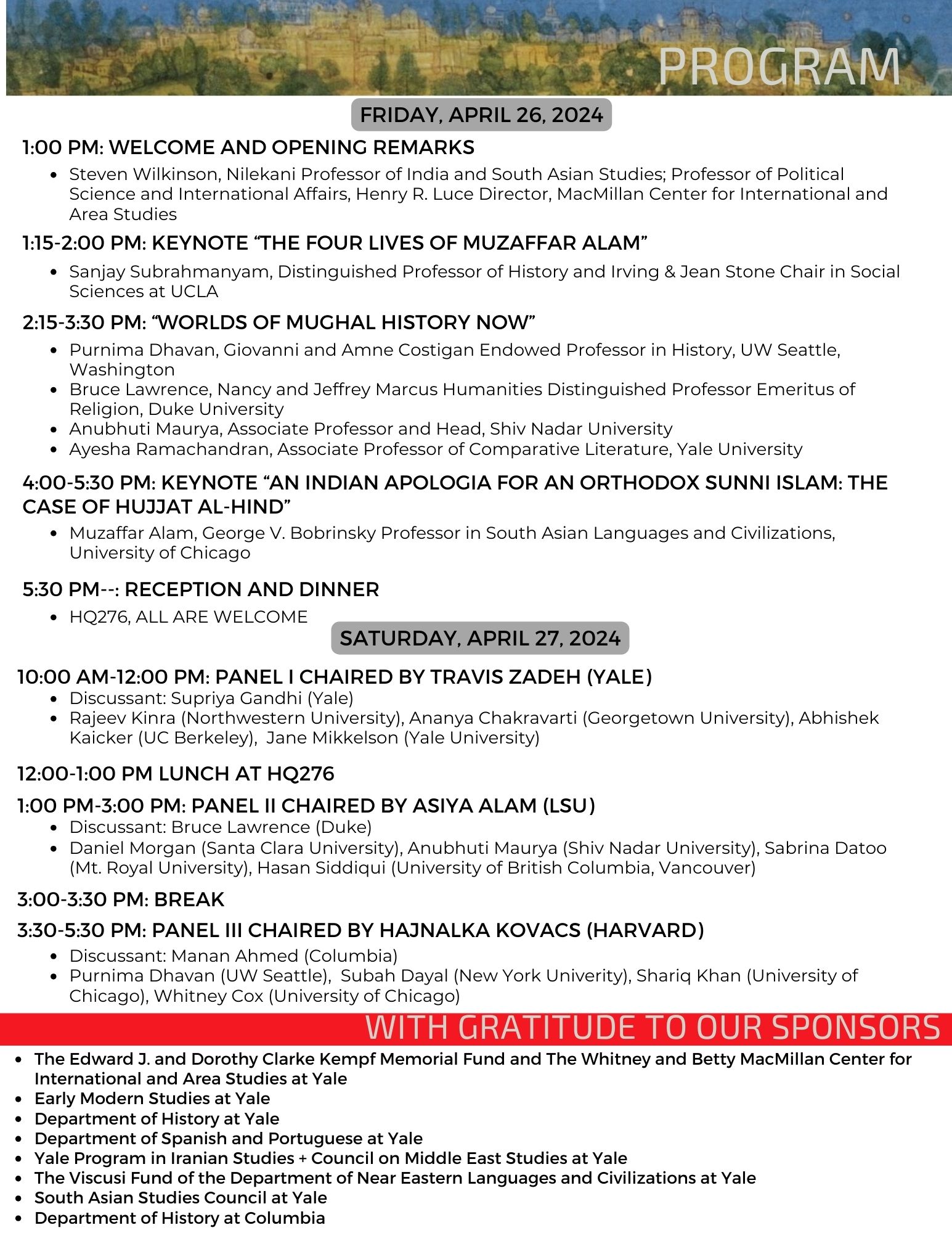Muzaffar Alam and the New Mughal Historiography
April 26th & 27th, 2024
Yale University
 |
|---|
 |
| Program |
Registration/Attendance
Open to all. No registration required
Organizing Team
- Manan Ahmed (Columbia University)
- Jane Mikkelson (Yale University)
About
We will gather on April 26-27 2024 at Yale for an enriching conversation that brings together scholars of literature, history, religion, culture, and politics in Hindustan ca.1000-2000CE, a millennium marked by multiple major epistemic and political shifts. Much of the recent work on this period has been informed directly (and indirectly) by the scholarship of Muzaffar Alam, George V. Bobrinskoy Professor of South Asian Languages and Civilizations at University of Chicago.
His major monographs–The Crisis of Empire in Mughal North India (1986), The Languages of Political Islam in India: c.1200-1800 (2004), The Mughals and the Sufis: Islam and Political Imagination in India, 1500–1750 (2021)–offer nuanced critical examinations of political and imperial formation, language and culture, community and belonging, and the making of publics. These major studies have shaped decisive conclusions on the vexed question of the eighteenth century Hindustan and the relationship between religion and political power for the Mughals.
In addition are his collaborations with Sanjay Subrahmanyam (Distinguished Professor & Irving and Jean Stone Endowed Chair in Social Sciences at UCLA), including The Mughal State 1526-1750 (1998), Indo-Persian Travels in the Age of Discovery: 1400-1800 (2007) and Writing the Mughal World: Studies on Culture and Politics (2011). Alam and Subrahmanyam have situated Mughal South Asia within broader early modern contexts, revealing routes of contact and entangled histories that extend across Afro-Eurasia. These studies became foundational for the modern framework of connected history.
Since joining the University of Chicago in 2001, Professor Alam has taught and advised multiple generations of specialists in South Asian studies, Persianate studies, and early modern studies. His scholarship and mentorship have helped create new understandings of the Mughal world, sparking new questions that move away from unhelpful narratives of “decline” or “great figures”-focused studies of South Asian pasts. Central to these broad reorientations are matters of language: Persian, and also Sanskrit, Hindavi, Dakkani, Urdu, and others. Alam’s ground-breaking studies have rechannelled attention to new scales and to different kinds of stories. His close engagement with texts in their original languages and contexts reveals how the political, the economic, the cultural, and the social are intertwined and refracted through the lives of bureaucrats and secretaries; at courts and ateliers; in literary imagination and in the lives of texts; in formations of sacral authority across geographies stretching from the Bengal Delta to the Caspian Sea. These are some of the topics and questions that animate the work of the scholars who will gather at this workshop.
This event is a celebration of Muzaffar Alam’s legacy as a scholar and mentor. The participants will be primarily his former students, who will present work that will be collected in an edited volume in his honour. The workshop will consist of short (twenty-minute) presentations, open to the public, spanning two days. Each day there will be two panels comprising three presenters and a respondent. Our event will begin with an opening keynote address by Sanjay Subrahmanyam and will conclude with a closing reflection by Muzaffar Alam.
Keynotes (April 26th)
- “An Indian Apologia for an Orthodox Sunni Islam: The Case of Hujjat Al-Hind” by Muzaffar Alam (University of Chicago)
- “Four Lives of Muzaffar Alam” by Sanjay Subrahmanyam (University of Californa Los Angeles)
Roundtable “Worlds of Mughal History Now” (April 26th)
- Purnima Dhavan (University of Washington Seattle)
- Ayesha Ramachandran (Yale University)
- Bruce Lawrence (Duke University)
- Anubhuti Maurya (Shiv Nadar University)
Workshop (April 27th)
On the second day we will have paper presentations from students and colleagues of Prof Muzaffar Alam. All panels are 2 hours with individual papers restricted to 20 minutes.
Panel Presentations
Panel I (chair: Travis Zadeh)
- Discussant: Supriya Gandhi (Yale)
- Rajeev Kinra (Northwestern University)
- Ananya Chakravarti (Georgetown University)
- Abhishek Kaicker (University of California Berkeley)
- Jane Mikkelson (Yale University)
Panel II (chair: Asiya Alam)
- Discussant: Bruce Lawrence (Duke)
- Daniel Morgan (Santa Clara University)
- Anubhuti Maurya (Shiv Nadar University)
- Hasan Siddiqui (University of British Columbia)
- Sabrina Datoo (Mt. Royal University)
Panel III (chair: Hajnalka Kovacs)
- Discussant: Manan Ahmed (Columbia)
- Subah Dayal (New York University)
- Purnima Dhavan (University of Washington Seattle)
- Shariq Khan (University of Chicago)
- Whitney Cox (University of Chicago)
Funding & Support
- The Edward J. and Dorothy Clarke Kempf Memorial Fund and The Whitney and Betty MacMillan Center for International and Area Studies at Yale
- Early Modern Studies at Yale
- Department of History at Yale
- Spanish and Portuguese at Yale
- Yale Program in Iranian Studies + Council on Middle East Studies at Yale
- The Viscusi Fund of the Department of Near Eastern Languages and Civilizations at Yale
- South Asian Studies Council at Yale
- Department of History at Columbia
Venue
Humanities Quadrangle, 320 York St, Room 276
Lodgings
The Study at Yale, The Graduate, or The Blake are good options for visitors. The first two are very close to campus, The Blake is about a 10 minute walk to campus. The corporate hotels in town, Omni, and Courtyard Marriott are other options–both are fine and a relatively short walk to 320 York, within 15 minutes.
Contact
- Manan Ahmed or Jane Mikkelson for all matters.
Event Photos














Press Coverage
TBD